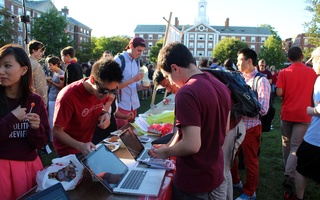This is the sixth instalment in a series of online-only Roundtables. This new content form from the Crimson Editorial Board seeks to present a diverse array of high-quality student opinions on thought-provoking issues.
If you would like to submit an opinion for this week's Roundtable topic "What was Hugo Chavez’s most significant contribution?" please e-mail your 200-300 word opinion to hpickerell@college.harvard.edu before Wednesday, March 6th at 11pm.
It’s Our Fault
Frankly, I was not exactly surprised to discover that about half of my classmates in the now infamous Government 1310 were being accused of violating the College’s policies on academic integrity. Although I sincerely sympathize with those individuals who were falsely accused, I do not think that the University is entirely at fault here.
To directly answer the question, no, Harvard does not place enough value on education. Although institutional change at the top maybe necessary, I would argue that the root of the problem truly lies with the student body itself. The scandal in Government 1310 last spring is not the first time a widespread cheating has occurred on campus, nor will it be the last. This problem is not caused by the Harvard faculty’s supposed apathy for undergraduate education, nor it is only a matter of institutional flaws within the system. Quite bluntly, the answer is human nature.
Unfortunately for many students, academics is simply not regarded as a worthy pursuit or a high priority and, as a result, students will choose to spend less time finishing their problem sets and completing their readings to make gains in the other areas in their life. Of course, those who are passionate about their field of study can invest most of their time in their academic pursuits; the problem is that many students do not. The vast majority of college students, not only those at Harvard, want to have everything: leadership positions, good grades, a prestigious internship, a vibrant social life, etc. without having to make the necessary personal sacrifices to reach those goals. Instead, some may turn to cutting corners and “collaborating” with others to finish their work on time, for as long as they get the grade they want, nothing else matters.
Yes, the university should attempt to evaluate not only faculty members’ contribution to academia, but also how well they perform in the classroom. Nevertheless, there is nothing the university can to do to help students from acting in their self-interest.
Timothy Tsai ’14 is a government concentrator in Leverett House. He is the former Director of the Inter-Collegiate Model United Nations Team.
Opportunities Outside Academics Prove Fruitful
As a graduating senior concentrating in Government with a secondary in Economics, I have enrolled in classes that have run the gamut from academically intense to those considered “joke” courses. I confess that I am guilty of having enrolled in several courses not out of rapt interest in the topic, but in an effort to balance out the substantial workload of extracurricular activities. Although, in my experience, Harvard has not placed enough value on academics, it is only because the University offers experiences that go far beyond the classroom.
From connections to internships across the globe, to opportunities to manage and run conferences for thousands of attendees, Harvard’s vast resources for its students serve as much value as its classes in educating the next generation of working adults. Undoubtedly, the academic reputation of Harvard contributes to the existence of these opportunities. However, having a schedule comprised entirely of academically rigorous classes would limit the ability of many students to take full advantage of Harvard’s extracurricular learning opportunities. We are students, but our role is not only to study—but it is also to learn, and Harvard offers extraordinary resources outside of academics to do so.
Charlene Wong ’13 is a government concentrator in Currier House. She is the Secretary General of World Model United Nations.
A Necessary Balancing Act
Read more in Opinion
Are You Ashamed of Bill O’Reilly?Recommended Articles
-
Not Just SchoolworkAs Commencement approaches, my roommate and I have spent a lot of time discussing how Harvard student life has changed ...
-
City Council Discusses Cambridge's Extracurricular Activity OfferingsPointing out that the days of playing pick-up baseball after school are long gone, officials from the Cambridge City Council and the Cambridge Schools Committee discussed ways to enrich Cantabrigian students’ extracurricular lives at the Council’s weekly meeting Monday night.
-
The Gravity of ExtracurricularsExtracurricular life at Harvard is certainly rich, but also intense, time demanding, and not insulated from pre-professional pressures.
-
 Harvard's Greatest Characters, at Harvard
Harvard's Greatest Characters, at Harvard -
 The Extra-Curriculum
The Extra-Curriculum -
The College Outside the ClassroomJust because a skill cannot be taught in a lab or lecture does not mean it is not worth learning.













